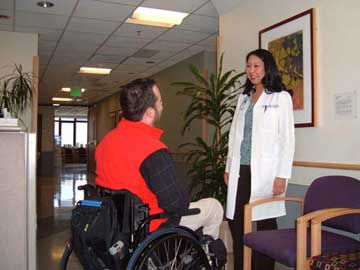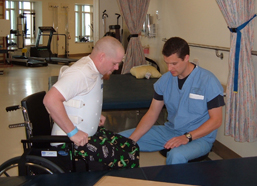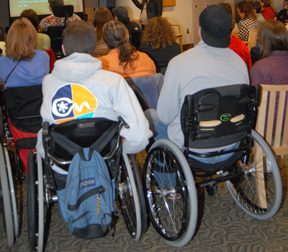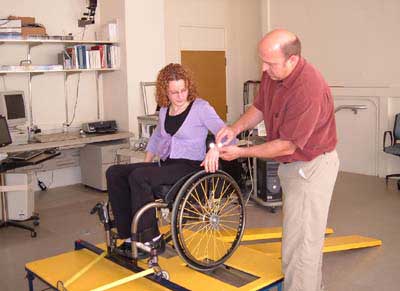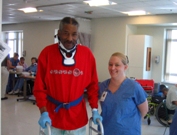Housing and Home Modification Resources
Finding housing that is both accessible and affordable is a challenge many people with SCI encounter soon after injury. Upon discharge from rehab—which may be only a few weeks after sustaining a life-altering injury—they must go somewhere, but the homes they were living in are rarely accessible to them without some modifications. Those who were renting at the time of their injury will most likely need to find a new situation since rental units usually cannot be renovated.
Accessible and Affordable Housing: Is it out there?
- Article from the Winter 2006 issue of SCI Update newsletter.
Disability Empowerment Center
- We can help you with housing referrals, transportation, job searching, technology, skill building and much more. Disability Empowerment Center provides free services to people who live in King County.
National Accessible Apartment Clearinghouse (NAAC)
- NAAC maintains the only national database of apartments with features for people with disabilities, listing more than 60,000 units in 47 states. NAAC is sponsored by the National Apartment Association and Clearinghouse services are free to all. Contact: 800-421-1221; www.accessibleapartments.org; clearinghouse@naahq.org.
Disabled Renters' Housing Rights
- A factsheet by AGIS (Assist Guide Information Service) describing laws relating to renting a house or apartment if you have a disability.
http://www.agis.com/Document/489/taste-and-smell.aspx
New remodel...new independence
- Article and photos describing a home remodel that allowed the home owner—who has tetraplegia (quadriplegia) due to a spinal cord injury—to live independently. This story first appeared in the Spring 2012 issue of our SCI Update newsletter.
Home Adaptations and Modifications after SCI
- SCI Forum presentation from June 2007. Watch the video or view the slide show from the presentation here: http://sci.washington.edu/info/forums/reports/home_mod_07.asp.
Rebuilding Together
- A non-profit home repair and rehabilitation program that helps low-income seniors, persons with disabilities and others to remodel or repair their homes, with local affiliates around the country. National office: 800-473-4229 (phone); info@rebuildingtogether.org (email); http://www.rebuildingtogether.org/ (Web site).
- Rebuilding Together Seattle
811 Harrison St, Seattle, WA 98109; Phone: 206-682-1231; email: info@rtseattle.org.
Regional Access Mobility Program (RAMP)
- This program builds ramps for people in Snohomish, Island, Skagit and King Counties of Washington State so they can stay in their own homes or return home from a hospital, rehabilitation center or nursing home (2812 Lombard Ave., #207,
Everett, WA 98201;
phone: 425-259-7922;
email:
Jerry12102@aol.com).
Adaptive Installations
- Specializes in accessible home modification and the installation of specialty equipment in the Puget Sound area. Phone: 800-765-1969/206-762-1969; email: medsurgsys@aol.com; Web site: http://www.adaptiveinstallations.com.
Accessible Home Design, Edition 2
- A guideline of the Paralyzed Veterans of America $22.95. Preview and order online at http://www.pva.org/site/PageServer?pagename=access_homedes or call 888-860-7244.
King County's Home Accessibility Modification Program (H.A.M.P.)
- Provides financial assistance for low and moderate income tenants to make accessibility modifications to their rental unit. Phone: 206-296-7640.
Master Builders Care Foundation of King & Snohomish Counties
- Builds free wheelchair ramps at their annual spring Rampathons for qualifying low-income disabled and elderly homeowners. For information and applications, contact:Master Builders Care Foundation, 335 116th SE, Bellevue, WA 98004; 425-451-7920; mbcare@mbaks.com.
Habitat for Humanity
- A nonprofit housing organization the builds affordable houses in partnership with persons who lack adequate shelter. Find the affiliate nearest you by visiting http://www.habitat.org/.
Easter Seals
- Assists children and adults with disabilities and their families with access, mobility, assistive technology and housing questions and recommendations, through a nationwide network of more than 450 service sites.
- Easter Seals National Office: 800-221-6827 (toll-free)
Mabel Dilley, 260-281-5700 or 800-678-5708 Ext. 123
Web site: www.easterseals.com/ - Easter Seals Washington
State Office:
157 Roy St.,
Seattle, WA 98109;206 281-5700
Web Site: wa.easterseals.com
AARP's Universal Home Design
The American Association of Retired Persons (AARP) resource for building or modifying a home using the principals of universal design for accessibility. Read online at http://www.aarp.org/universalhome.
Universal Design Living Laboratory
Information about universal design and green building principals, safety, and healthy home practices to benefit the widest possible range of people in the widest range of situations, accommodating people of all sizes, ages, and abilities. Visit their Web site at http://www.udll.com/.
Affordability
After an SCI, many people need to consider low income, accessible public housing. This is often a good alternative for individuals whose financial situations have changed drastically since their injury.
- The Seattle Housing Authority
(206-615-3300; www.seattlehousing.org/Housing/programs.html) accepts applications for accessible housing, although the wait for an accessible unit can be as long as two years. - The King County Housing Authority
(206-574-1100; www.kcha.org/lookingforhousing/lookingforhousing.aspx) provides an array of affordable housing options as well. - Washington State office of Housing and Urban Development (HUD)
www.hud.gov/local/index.cfm?state=wa ; 206-220-5101; 877-741-3281) provides affordable housing options throughout the state.

